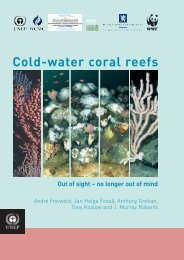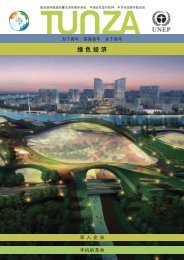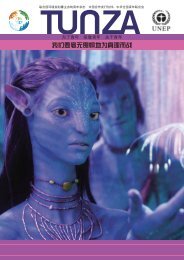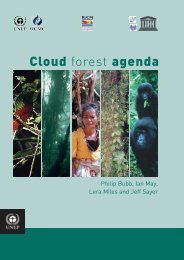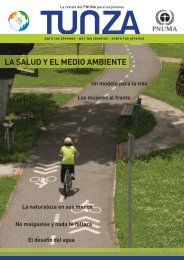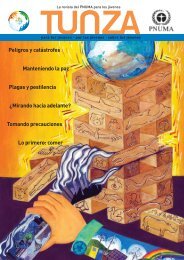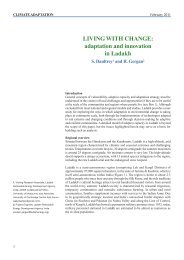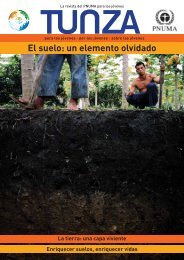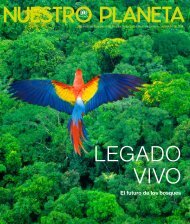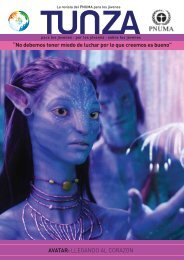Tunza Vol. 8.3 - UNEP
Tunza Vol. 8.3 - UNEP
Tunza Vol. 8.3 - UNEP
Create successful ePaper yourself
Turn your PDF publications into a flip-book with our unique Google optimized e-Paper software.
Eco-pioneers<br />
Cassandra Lin, USA<br />
Two years ago, my friend and I wanted to find a sustainable solution to two local<br />
problems: sewers were being clogged with grease and fat, and local families<br />
couldn’t afford heat because of unemployment. We came up with Project TGIF<br />
– Turn Grease Into Fuel – to work with restaurants and residents to create a<br />
sustainable system to collect grease, refine it into biofuel, and distribute it to<br />
families in need. We asked local residents to deposit used grease in barrels at<br />
the town’s transfer station, and gave restaurants collection barrels too. Grease<br />
Co., our partner, collects and delivers the grease to a biodiesel refiner. Since<br />
cooking fat is a commodity, all funding is generated from the waste. My volunteer<br />
group, Jr. WIN, keeps a fifth to buy Bioheat, a biofuel/diesel mix, for families who<br />
need it to heat their homes, and Grease Co. keeps the rest. Everyone wins: oil<br />
is recycled, companies profit, and families receive lower-emissions fuel. So far,<br />
we’ve donated more than 15,000 litres of Bioheat, heating 40 homes. At this rate,<br />
more than 120,000 litres of biodiesel will be generated each year, offsetting 250<br />
tonnes of CO2 emissions.<br />
Cassandra Lin<br />
Adital Ela, Israel<br />
When I went on a 10-day silent walking retreat in the south of France, I came<br />
across places that had long been untouched by humans. I wondered whether<br />
humans could live with nature without disrupting it – and how I could design<br />
from a mindset of deep participation between people and the environment. I now<br />
explore these ideas at S-Sense Design, teach sustainable design at the Holon<br />
Academic Institute of Technology (HIT) in Israel, and lead design workshops<br />
for young people in Brazil, Mexico and Europe. Students at Universidad<br />
Iberoamericana, Mexico City, invented the Alive Bus Stop: climbing plants grow<br />
over its roof, which collects rainwater for the plants. The TWO GO, designed<br />
by Yael Livneh at HIT, is a do-it-yourself project that encourages the reuse of<br />
plastic milk crates to create bicycle seats and storage units. I designed Slow<br />
Water, an indoor water-recycling system that collects water from the basin and<br />
reuses it for lavatory-flushing and other needs, and WindyLight – outdoor lights<br />
whose LED bulbs are operated by wind energy – a direct link between renewable<br />
resources and basic human needs.<br />
Yael Livneh<br />
Nina Dudnik, USA<br />
During a year working abroad in a West African rice research station, I was struck<br />
by how frugal my colleagues were with equipment, washing and drying disposable<br />
test tubes and reusing them for months. But at Harvard where I was doing my<br />
PhD, we regularly got new lab equipment. I wondered where the used gear went,<br />
and discovered that it was often stored and forgotten, sold for scrap or simply<br />
thrown out. My friends and I started a volunteer programme to collect equipment<br />
and identify labs that needed it. This grew into Seeding Labs, which I now run<br />
full-time. Our partner universities and research companies contribute surplus<br />
equipment and help us send it to scientists around the world. We’ve worked in<br />
16 countries already, including Argentina, Chile, Ecuador, Venezuela, Paraguay,<br />
Haiti, the Dominican Republic, Congo, Nigeria, Ghana and Kenya. Seeding Labs<br />
is about human resources, too: it’s a natural way to connect scientists to each<br />
other. We’ve started exchange programmes that enable scientists from different<br />
countries to share ideas and form links which I hope will benefit them throughout<br />
their careers.<br />
Nina Dudnik<br />
22 TUNZA <strong>Vol</strong> 8 No 3



